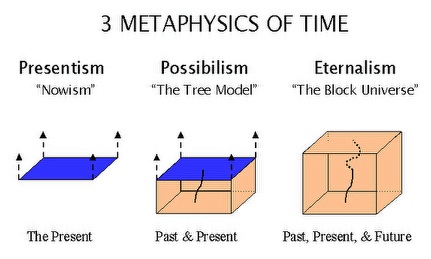The idea that time isn’t “real” is an ancient one — if we’re allowed to refer to things as “ancient” under the supposition that time isn’t real. You will recall the humorous debate we had at our Setting Time Aright conference a few years ago, in which Julian Barbour (the world’s most famous living exponent of the view that time isn’t real) and Tim Maudlin (who believes strongly that time is real, and central) were game enough to argue each other’s position, rather than their own. Confusingly, they were both quite convincing.
 The subject has come up once again with two new books by Lee Smolin: Time Reborn, all by himself, and The Singular Universe and the Reality of Time, with philosopher Roberto Mangabeira Unger. This new attention prompted me to write a short essay for Smithsonian magazine, laying out the different possibilities.
The subject has come up once again with two new books by Lee Smolin: Time Reborn, all by himself, and The Singular Universe and the Reality of Time, with philosopher Roberto Mangabeira Unger. This new attention prompted me to write a short essay for Smithsonian magazine, laying out the different possibilities.
Personally I think that the whole issue is being framed in a slightly misleading way. (Indeed, this mistaken framing caused me to believe at first that Lee and I were in agreement, until his book actually came out.) The stance of Maudlin and Smolin and others isn’t merely that time is “real,” in the sense that it exists and plays a useful role in how we talk about the world. They want to say something more: that the passage of time is real. That is, that time is more than simply a label on different moments in the history of the universe, all of which are independently pretty much equal. They want to attribute “reality” to the idea of the universe coming into being, moment by moment.
Such a picture — corresponding roughly to the “possibilism” option in the picture above, although I won’t vouch that any of these people would describe their own views that way — is to be contrasted with the “eternalist” picture of the universe that has been growing in popularity ever since Laplace introduced his Demon. This is the view, in the eyes of many, that is straightforwardly suggested by our best understanding of the laws of physics, which don’t seem to play favorites among different moments of time.
According to eternalism, the apparent “flow” of time from past to future is indeed an illusion, even if the time coordinate in our equations is perfectly real. There is an apparent asymmetry between the past and future (many such asymmetries, really), but that can be traced to the simple fact that the entropy of the universe was very low near the Big Bang — the Past Hypothesis. That’s an empirical feature of the configuration of stuff in the universe, not a defining property of the nature of time itself.
Personally, I find the eternalist block-universe view to be perfectly acceptable, so I think that these folks are working hard to tackle a problem that has already been solved. There are more than enough problems that haven’t been solved to occupy my life for the rest of its natural span of time (as it were), so I’m going to concentrate on those. But who knows? If someone could follow this trail and be led to a truly revolutionary and successful picture of how the universe works, that would be pretty awesome.

@John Barrett
“You are assuming that every event in the past is tied to every single event in the present”. No I’m not, honest.
“You are also assuming that a timeline could not branch or split”. Again, no I’m not, really.
Question for those more knowledgable than I:
As a long time student of relativity, I’ve always argued that time was a malleable quality that ebbed and flowed with reference frames (vs. the classical, absolute time of Newtonian physics).
Recently, however, somebody pointed out that the instantaneous nature of entanglement (e.g. the simultaneous collapse of two particles into similar parameters when observed) implies an absolute time domain (otherwise how can one argue two particles on opposite ends of the universe collapsed into value X simultaneously). Does this stand up to scrutiny, or is entanglement a feather in the cap for the absolutist perspective?
Erik
The first thing I would suggest you do to reach an answer is, when you refer to time in your question, ask yourself, quite simply which of its two root definitions (as mentioned in various posts above) are you referring to? Clarity on definition of terms always helps, clearly.
Time as the abstract framework? Well any abstract framework is “absolute”.
Or Time as a non-specific set of events? Well, that could certainly be considered “malleable” though some further expansion here needed as to what you mean.
And can I ask what is it that you mean when you say “time domain”? Not sure I understand the phrase either.
@Erik
Technically, no one really knows how or why entanglement actually works (but me). Officially, it happens at speeds faster than light (that is not allowed by relativity), but it is thought that useful information cannot be sent by this means. Therefore, information isn’t actually traveling faster than light, exactly. Then again, it could just be a technical issue of not having the technology to do it. Basically, there is an action at distance that can occur faster than light.
As far as an “absolute time domain”, I don’t think scientist would be able to actually even accurately define such a thing. That would be getting into something like hidden variables that have not been discovered yet, as to the true nature as to why we see the quantum behavior that we do. I would think of it as coming from something more like a “null spacetime domain”. I would think if relativity was combined with quantum mechanics (hidden variables) that it would say that there was no spacetime between events, and that would allow for an action at a distance.
How do you derive phenomenal time from worldlines? They might not even be compatible.
Endless metaphysics.
Metaphysical “issues” by definition can’t be settled by experience. They are just using different words to describe exactly the same thing. It’s based on how the person feels about different terminology.
Vector Shift,
What is the point of your comment about metaphysical issues in this context (i.e., in this discussion regarding the reality of time)? The reality of time need not (and should not) be regarded as a metaphysical issue as you have defined the term “metaphysical” here. Things that can be settled by experience can be, should be, and have been, said about the reality of time.
Has anyone done the experiments necessary to settle which of presentism, possibilism and eternalism is correct? If there any empirical content to these notions?
Enduring and Perduring should also be put to experiment.
People argue that “the past” still “exists” and that “the future” already does? Even worse that they are “real”.
Anyone worried about these things should figure out if there is any empirical content to whatever they are talking about. I think that they have too much fun having endless discussions.
Incidentally I read your paper “Toward a Helpful Paradigm for the Nature of Time” and you seem to have a better handle on it than most. Also I liked “The Nature of Time”-By Julian Barbour.
http://fqxi.org/data/essay-contest-files/Barbour_The_Nature_of_Time.pdf
It seems to go along with “time” being a word that we use to relate relative changes. He appears to formulate classical mechanics without the usual time as parameter. I don’t find this particularly surprising since it’s something that we abstract from relative changes. Apparently he thinks that this means that it is a illusion or doesn’t exist according to his Wikipedia entry :
His 1999 book The End of Time advances timeless physics: the controversial view that time, as we perceive it, does not exist as anything other than an illusion,…
Maybe he just says radical things to sell books?
@vector shift
“…the controversial view that time, as we perceive it, does not exist as anything other than an illusion,…”
Given that there is NO empirical evidence of time being a real, tangible ‘thing’ (ALL that we actually perceive or evidence are events) – I would say that the idea that time is a tangible concrete noun (rather than merely an abstract noun) is the controversial view – as said, it has absolutely no bases in evidence.